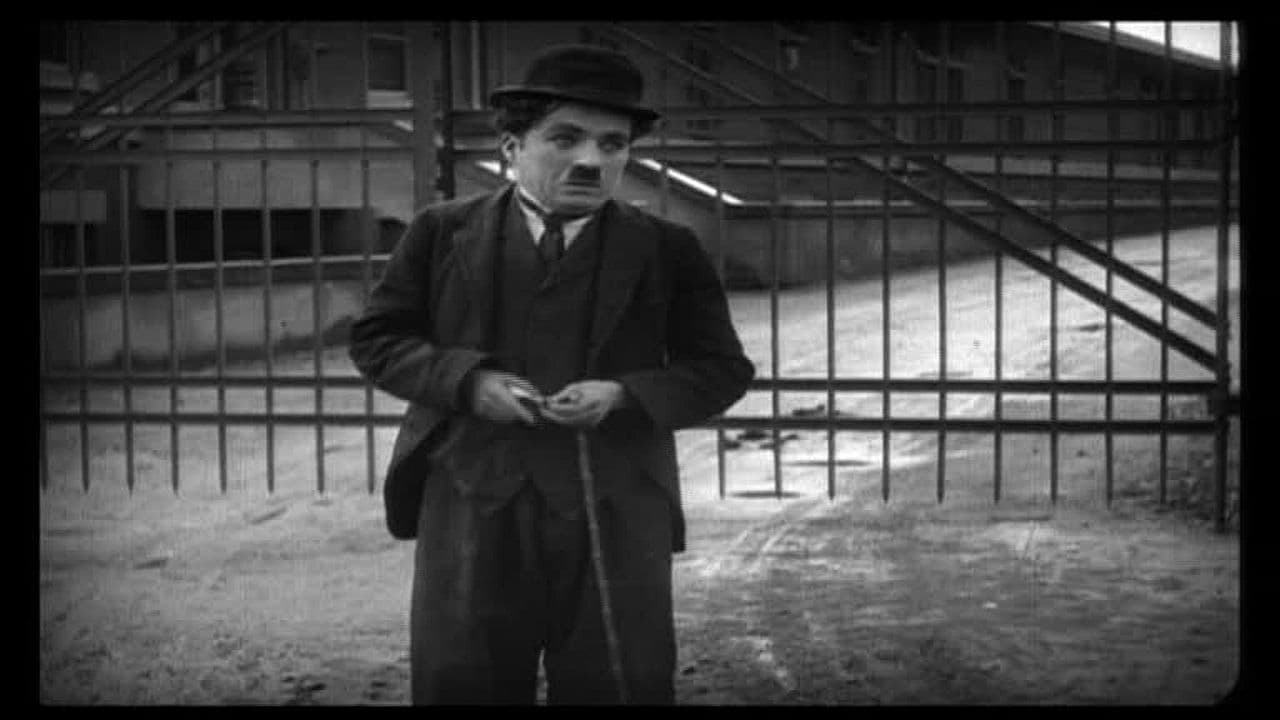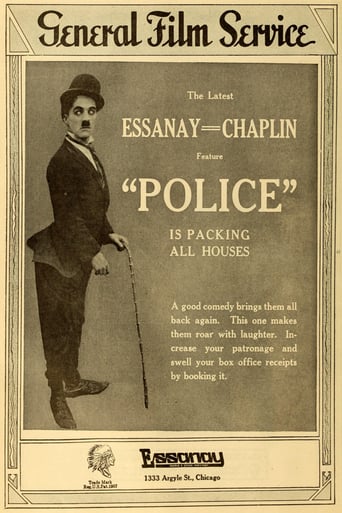

Wonderful character development!
... View MoreWhat a waste of my time!!!
... View MoreBlending excellent reporting and strong storytelling, this is a disturbing film truly stranger than fiction
... View MoreThe movie's neither hopeful in contrived ways, nor hopeless in different contrived ways. Somehow it manages to be wonderful
... View MoreCharlie Chaplin's penultimate film for Essanay is regarded as amongst the best of his output for the company. The film was actually released after his first film for the Mutual Film Corporation The Floorwalker, over five months after his previous Essanay film Burlesque on Carmen. Another interesting release related fact is that Police released over two years before his finally Essanay film Triple Trouble which was created in part by Chaplin regular Leo White by piecing together unused shots from other Chaplin films including this and the unfinished feature Life. Police stars Chaplin as a recently released convict trying to make it in a cruel and hostile world. The initial plot follows along the same lines as much of Chaplin's work. There were portions of Police that reminded me of Modern Times and the idea of the Tramp struggling to survive was used by Chaplin time and time again. It has been suggested that Chaplin borrowed the plot from Broncho Billy's His Regeneration for which he had an uncredited cameo and I agree that the character development at least is shared between the two.Having been swindled by a dodgy God botherer and having no money to pay for a bed for the night, the ex-con is held up at gunpoint by a man who turns out to be his ex-cell mate (Wesley Ruggles). The thief convinces the Tramp to assist him in robbing a nearby house and the two set about breaking in. Once inside they are confronted by the Daughter of the House (Edna Purviance) and chased by a number of Cops (Leo White, John Rand & Fred Goodwins). The Tramp manages to become the hero of the piece late on when he saves the Daughter of the House from a nasty attack. Police begins very promisingly with some wonderful comic business early on. A highlight came when Chaplin visited a fruit seller and tried numerous apples, taking a bit and putting them back until he found one to his liking. The first time he put an apple back I actually snorted with laughter. I also enjoyed the scene in which Chaplin meets his ex-cell mate and sneakily robs him while the man is searching Chaplin for money. It's subtle and clever. On a technical level the film is very good. I liked the scene in which Chaplin and Ruggles were shown only in shadow. This isn't something I remember seeing from Chaplin before and felt a bit German expressionist. I also thought that the use of filters was very accomplished. Filters are one of my least favourite aspects of early cinema but here Chaplin uses them well, leaving you in no doubt as to the time or setting of a scene. I felt that the second half didn't quite live up to the first and certainly wasn't as funny. That being said it was actually more reminiscent of later Chaplin, forsaking jokes in favour of plot and character development. Unfortunately the romantic element just doesn't live up to the likes of City Lights and the film's ending is a little flat. www.attheback.blogspot.com
... View MoreChaplin wrote, directed, and starred in this film, his last for Essanay. The company reedited the film after Chaplin left, and it took months more to release as a result. Chaplin is a man released from prison who is immediately swindled by a sidewalk preacher. He meets up with his old cell-mate who is trying to rob him on the sidewalk, and they decide to break into a mansion where Edna Purviance lives with her old, sick mother. Once inside, there are some good sight gags, as the two crooks are discovered by Edna. She'll allow them to take some things and leave as long as they don't disturb her mother upstairs. This doesn't sit well with Chaplin's partner in crime, and Chaplin finds himself defending Edna. The police arrive in time, and Chaplin is set straight by Edna and the lie she tells the police. Chaplin's comedy is more subtle in this film, but there are still some fine brief bits of slapstick. Chaplin was quickly realizing his films were more poignant and successful when the plots were more sophisticated and the slapstick was more restrained. Wesley Ruggles and Snub Pollard have supporting roles in this one. **1/2 of 4 stars.
... View MoreOne of my favorite things about watching these old short comedies that Chaplin was making before he really understood what his own message was is to watch the development not only of his style and on screen talent but also the development of his understanding of his audience. The tramp is the cinema's most famous everyman, and as far as I know this is his most criminal outing yet. The movie opens with him being released from jail and immediately two things happen: first he is swindled by someone claiming to be trying to get him on the right path, and second, he stumbles across a drunk with a nice gold watch hanging from his vest, begging to be stolen. He fumbles with it a bit, but never once indicates that the thought of stealing it ever enters his mind, even though he could easily get away with it.But before you go thinking that the tramp was just in the wrong place at the wrong time when he was convicted of whatever crime he was just released from prison for, he immediately becomes involved in a plot to rob a wealthy mansion in cahoots with none other than his old cell-mate. Apparently he didn't learn his lesson so well!Luckily, the tramp lives in a world where mansions are populated by his old pal Edna Purviance who, when bothered by the robbers intrusion, calls the police, who are so indifferent to the emergency call that they hang out at the police station chatting and sipping drinks before responding. In true Chaplin form, the tramp manages to win Edna's sympathy, and when the police finally arrive (in true Chief Wiggam form, as it were), he convinces them that he is her husband, and the tramp cheerfully enjoys a quick smoke with the three officers, tapping ashes into one of their hands on the way out, just as the one officer who knows what's going on arrives and throws himself against the door. The tramp has already slammed the door shut by this point, so he casually drop kicks his cigar as only Chaplin can and relishes in the fact that he has won. The unpleasantness that is sure to follow is unimportant, because soon Charlie falls in love and learns that there are more important things in life than robbing people. This is also one of the earliest films where Chaplin so clearly illustrates his almost Robin Hood-like contempt for the police's oppression of the people. Great stuff!
... View MoreThe Tramp never had much going on with authority and the police in the first place, but we never saw (well, at least I didn't) Chaplin quite as criminal as in 'The Police'.In the first scene he's released from prison and a minister of some sort wants to guide him on the right path, but Charlie finds himself robbed by this imposter. So out of money and out of hope he runs into his old cell-mate, and the two of them decide to rob a big mansion.When they finally get inside (after an encounter with a police-officer), the young woman living there (a part by Edna Purviance) is being alarmed by some noise, and she calls the police. They don't seem too interested though, as they finish their drinks before checking out the scene.Meanwhile, Edna confronts the burglars and lets them take away some things, as long as they don't go up, as that would scare her mother. Charlie agrees but his mate doesn't, and they get into a fight just as the police finally arrives as well. In the end, Edna feels sorry for Charlie and claims that he's her husband so he won't be arrested, and Charlie finally sees that robbing people isn't the right way to live. Great ending there, with Charlie in love and standing in the sun, of a pretty good Chaplin short about forgiving and living well. 7/10.
... View More